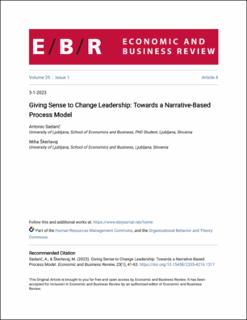Giving Sense to Change Leadership: Towards a Narrative-Based Process Model
Peer reviewed, Journal article
Published version
Permanent lenke
https://hdl.handle.net/11250/3055792Utgivelsesdato
2023Metadata
Vis full innførselSamlinger
- Scientific articles [2181]
Originalversjon
10.15458/2335-4216.1317Sammendrag
Introduction: Recent studies on change agency and organizational change failure have significantly broadened the organizational behavior perspective on individual change experiences, however, the underlying mechanism for change leaders’ influential behavior remains a relatively underspecified area.
Objectives: Our central theoretical contribution focuses on the ways in which linking the findings from different research areas that deal with storytelling and persuasive communication can contribute to understanding the underlying mechanism of change leaders’ influential behavior.
Methods: We examine the various strands of research in management concerned with change leadership and persuasive communication, and propose a multidisciplinary perspective from developmental psychology, linguistics, political science, consumer psychology, and religious studies.
Results: Our approach draws on the key theoretical perspectives from the social cognitive theory and commensurable interdisciplinary findings as the basis for a narrative-based process model of change leaders’ influential behavior. Our model includes propositions about the change leader’s interpretation of ideological change as well as the change leader’s process of sensemaking and sensegiving.
Conclusion: We argue that the change leader’s persuasive communication efforts are based on the leader’s narrative intelligence and influence, which promote the change recipient’s attachment formation.

